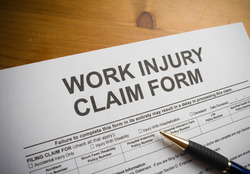Mississippi Workers' Compensation Commission rulings under review for anti-worker bias
 By Joe Atkins, Labor South
By Joe Atkins, Labor SouthThe Mississippi Workers' Compensation Commission and its rulings will be the subject of a months-long review by the Joint Committee on Performance Evaluation and Expenditure Review, PEER Director Max Arinder said recently.
"We have had some complaints filed with the committee about actions of the commission, about some of the decisions," Arinder said.
PEER, whose 14 members include seven state senators and seven state House members, initially approved plans to conduct a review of the commission last October pending the availability of resources. It reaffirmed this decision in December.
As detailed in this column last August, a study ordered by Jackson plaintiffs' attorney Roger K. Doolittle showed that the three-member commission is decidedly on the side of employers in most disputes between employers and employees regarding workplace injuries. According to the study, the commission's three members voted to reject administrative law judge decisions favoring workers between 75 and 91 percent of the time.
"I've been doing this for 25 years, and I've never seen a commission this conservative," said Jackson attorney John Jones, who handles workers' compensation cases.
Commission Chairman Liles Williams disputed claims of bias but conceded that his own numbers show him voting for the employer 59 percent of the time. Williams' six-year term in office was scheduled to end in December, but sources say he has gotten the nod from the governor for a second term.
Arinder said he wasn't at liberty to discuss details of the complaints received about the commission or the upcoming PEER review. However, he said he expected the review to begin in a matter of weeks and that he hoped it wouldn't take longer than three months to complete. PEER reviews assess and evaluate the accountability of state programs and agencies. Like many state programs, PEER has suffered significant budgetary cutbacks in recent years, reducing its staff from 27 to 21 positions.
The state Court of Appeals handed the Workers' Compensation Commission a setback in October when it reversed the commission decision in the case of Shirley Cole versus Ellisville State School. The commission had earlier overturned an administrative judge ruling in favor of Cole, a school employee who injured her knee at work. "The Commission erred by reducing Cole's award of permanent-partial disability benefits," ruled the Court of Appeals with all of its nine judges in concurrence. "We reverse the Commission's decision ... and reinstate the [administrative judge's] decision."
The pending review won't mark the first time the commission has come under PEER's scrutiny. At the beginning of Gov. Barbour's first term, PEER issued a report that said the commission needed more management oversight, and it pointed to poor record-keeping of employee time sheets and accrued leave files.
The state House Insurance Committee held a hearing on Doolittle's findings more than a year ago and discussed the possibility of an investigation of the commission. However, the investigation remained "in limbo" a year later because of the sharp differences between those on opposing sides of the issue, said committee chairman Walter Robinson of Bolton.
Although statistics on work-related injuries and deaths in Mississippi can be difficult to pin down, attorney Jones estimates at least as many as 13,000 workers are injured on the job every year. Some 80 Mississippi workers died from work-related injuries in 2008.
Mississippi has long ranked at or near the bottom in the nation in workers' compensation benefits. It was the last state in the nation to adopt a workers' compensation law. Even today it remains one of the few states that award less than 100 percent of weekly wages to workers injured on the job. Even if the commission rules in their favor, injured Mississippi workers only receive two-thirds of their weekly wages.
A 2005 study by the Workers Compensation Research Institute showed that cases in Mississippi also take much longer to resolve than cases in other states. "The average interval from petition filing to a judge's order was almost 20 months," the study said.
Tags
Joe Atkins
Joe Atkins is a professor of journalism at the University of Mississippi and author of "Covering for the Bosses: Labor and the Southern Press." A veteran journalist, Atkins previously worked as the congressional correspondent with Gannett New Service's Washington bureau and with newspapers in North Carolina and Mississippi.
